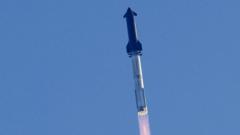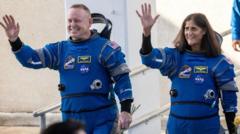The latest test flight for SpaceX's Starship rocket resulted in an unexpected failure shortly after launch from Texas, although the Super Heavy booster successfully returned to the ground. This test follows a period of competition in space exploration technology, particularly between Elon Musk and Jeff Bezos.
SpaceX Starship Test: A Fiery Setback Following Recent Success

SpaceX Starship Test: A Fiery Setback Following Recent Success
In a dramatic turn of events, SpaceX's much-anticipated Starship test ends in failure despite the successful recovery of its Super Heavy booster.
In a dramatic turn of events, SpaceX's latest test of its groundbreaking Starship rocket ended in failure minutes after launch from Texas on Thursday. Officials at SpaceX reported that the upper stage experienced a "rapid unscheduled disassembly" shortly after takeoff. However, the Super Heavy booster successfully returned to its launchpad, earning enthusiastic applause from ground control teams.
This test flight took place shortly after Blue Origin, backed by Amazon's Jeff Bezos, executed the first flight of its New Glenn rocket system—a clear indication of the competitive landscape between the two tech giants vying for dominance in space exploration.
Shortly after the launch, which occurred at 17:38 EST (22:38 GMT), SpaceX tweeted that they had lost the Starship upper stage after it separated from the Super Heavy booster nearly four minutes into flight. Communications manager Dan Huot announced during a live stream that mission teams had lost contact with the spacecraft.
Elon Musk acknowledged the situation on social media, stating, "Success is uncertain, but entertainment is guaranteed!" He shared video footage of the launch, which attracted 7.2 million views. Preliminary analysis suggests that an oxygen/fuel leak may have contributed to the failure, but Elon Musk remains optimistic, indicating that "improved versions" of the rocket are already prepared for the next launch, expected within a month.
The US Federal Aviation Administration (FAA) also confirmed that it was monitoring the situation, acknowledging that an anomaly occurred during the mission. Brief air traffic restrictions were implemented around the area where debris fell, but normal operations have since resumed.
On the heels of this setback, SpaceX recently launched an uncrewed Falcon 9 rocket from Florida carrying two lunar landers and a micro rover toward the Moon. Meanwhile, Blue Origin's successful launch marks a significant milestone for Bezos' company, which has invested years in preparation for orbital flight.

















